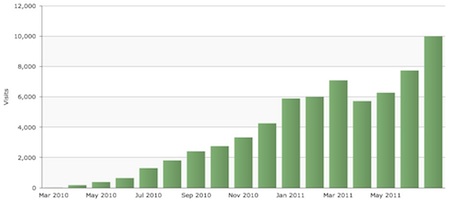11 Secrets to Blogging about Building Science (or Any Topic, Really)

 About a decade ago, I read about a new book that Stephen King had just published. It was titled, On Writing, and I was puzzled about why he’d want to write about writing. I mean, the guy’s a fiction writer, not an English professor. I never read the book, though I probably should, but somehow, just the fact that he wrote it really lodged itself into my brain.
About a decade ago, I read about a new book that Stephen King had just published. It was titled, On Writing, and I was puzzled about why he’d want to write about writing. I mean, the guy’s a fiction writer, not an English professor. I never read the book, though I probably should, but somehow, just the fact that he wrote it really lodged itself into my brain.
About a decade ago, I read about a new book that Stephen King had just published. It was titled, On Writing, and I was puzzled about why he’d want to write about writing. I mean, the guy’s a fiction writer, not an English professor. I never read the book, though I probably should, but somehow, just the fact that he wrote it really lodged itself into my brain.
Now, having done a ton of writing in the past year and a half, I understand. I’ve always done a fair amount of writing in my life – letters, emails, test questions… In grad school, I wrote refereed journal articles (and even had one published in Physical Review Letters) and a dissertation.
But I didn’t really consider myself a writer. All that writing was just the stuff everyone does in their lives and work. With the Energy Vanguard blog as well as other writing projects I’ve done recently, however, I’ve started to think of myself as a writer, and I feel the kind of compulsion that I imagine Stephen King felt when he wrote the aforementioned book.
So today, I write about blogging and pass on some of my tips. Before I get to the tips, though, let me update you on how blogging has helped grow traffic to our site and generate business. Back in January, I wrote about the first nine months of the Energy Vanguard blog and showed a chart of our organic search traffic. Below, is the updated chart, showing our search traffic through the end of July.

As you can see, we were getting pretty much no organic search traffic when I started in March 2010, a little over 4000 visitors at the end of January, and last month we were just shy of 10,000 visitors, just from organic search. Most of this traffic finds us because of the blog. And yes, we do get business from some of the people who find us this way.
Ready to find out what my secrets are? Here ya go!
- Know your stuff. You don’t have to be an expert in everything. You do have to be good enough to back up what you say.
- Find the juicy topics. What’s controversial in your field? What myths get perpetuated that you can help dispel? Power attic ventilators and thermostat settings are two recent ones that have been juicy for us.
- Write about what you’re doing. In our recent HERS rater class, we made some field visits. I got two articles from those visits: one on paint peeling from the ceiling and one on radiant barriers.
- Start with short, simple articles. If you look back at the early articles in the Energy Vanguard blog, you’ll see they’re generally short and sweet. Keep writing short ones when you’re established, too, like this one I wrote on building science.
- Take a lot of pictures. I can’t tell you how many of my articles resulted from me just looking through my photos. If I’m ever stumped on what to write about, which is rare, this is one of my fallback methods.
- Use good photos in all your articles. A digital camera isn’t expensive. Keep one with you always. The article I wrote this week on panned joist return ducts wouldn’t have been nearly as good without the photos.
- Explain the fundamentals. A lot of people are looking for the information you have. I’ve done this with air conditioning and radiant barriers recently.
- Use lists. People love to read lists: 7 habits, 16 random thoughts, 3 reasons, 4 products…and of course, 11 Secrets to Blogging about Building Science (or Any Topic, Really). You’re reading this, aren’t you?
- Write about results of research papers. I’ve done this several times, most recently with the accuracy of the most-used home energy rating software.
- Identify the topics and keywords you want to focus on. I think if you look through the titles of our blog articles here, you won’t have trouble finding out what ours are.
- Find your voice. I don’t know why, but for some reason, a lot of people try to sound like someone else when they write. The most effective blogs, I find, are the ones where the person behind the writing shines through. Here’s a big hint: Write like you talk. Another big hint: The apostrophe is your friend. In other words, use the same contractions you use when speaking. I wouldn’t’ve said that if it weren’t true, ya know.
Those 11 tips are a good starting point. Of course, you also need to be consistent. Since I started the blog, there hasn’t been a single week when I didn’t publish at least one article. You also need to promote your blog and each article you write. If you’re not on LinkedIn, Facebook, and Twitter, you need to be.
There you have it. Now go out and blog!
This Post Has 11 Comments
Comments are closed.

Thanks for the juice.&
Thanks for the juice.
I am working on a new project and this info I believe will be very helpful, ya know.
Chris: You
Chris: You’re welcome! Good luck with the new project.
#11 is my favorite because I
#11 is my favorite because I love to use my “voice” when I write. I do so many research articles that it’s refreshing to do my own stuff using my personality. Even though you are writing about serious stuff, you always make it accessible to people out of the industry, like me, and you use your voice to make it appealing. Keep it up.
Alexandra:
Alexandra: I think #11 may be the most important of all of them. If you can’t write in a way that holds people’s attention, the others don’t matter as much. Glad you’re one of our readers!
Hmmm 11 secrets & not
Hmmm 11 secrets & not the true secret of your sucess…
August 18th:
@EnergyVanguard: How do I decide what to write about in the EV blog? An online discussion. A question. A photo. A field visit. Or aliens. Mostly aliens.
in all seriousness, nice article Allison – I know I have to work on #5 & 6 the most as I am generally driving away & go – ooh I should have taken pics of…
Sean: Well
Sean: Well, I can’t say it in every article or new readers won’t have to do any work to find the true secret. ;~) I’ve left a house many times and wished I’d gotten photos or looked through my photos and wished I’d gotten others there. It’s a great idea to take a lot of photos from a liability standpoint, too.
Great post Allison. ACI is
Great post Allison. ACI is going to expand their blogging (by expand I mean start). Love the idea of using photos as jumping points. And the Steven King book, though I’ve not read it, is purported to be stellar. He says he writes 4 hours a day and reads 4 hours a day.
Let me take this opportunity
Let me take this opportunity to say that On Writing is a fantastic read. One of my Journalism professors loaned it to me as an undergrad – very inspirational for anyone involved in the field of writing.
Jennifer:
Jennifer: That’s great to hear that there will soon be an Affordable Comfort blog! I look forward to reading it.
adam: OK, I’ll order the book. Thanks for the endorsement!
Good post, Alison. What I’d
Good post, Alison. What I’d like to have some insight on is how to be regular. I always have good intentions but I always seem to put the time off to write.
Arlene: I
Arlene: I think maybe the thing that will help you the most to write more often is to write less. By that, I mean write less in each article. Some of your articles get very long.
My general goal is 500-800 words for each article. That one I wrote about ignoring the laws of building science was only 211 words. Short is good. A lot of times, when one of my articles gets too long, that means I need to split it up into smaller posts.
Aside from writing shorter pieces (which, by the way, are more likely to be read, too!), here are some other ideas:
*Try to find a regular time to write.
*Set a goal of doing at least one post per week.
*When you get an idea for an article, write it as soon as you can.